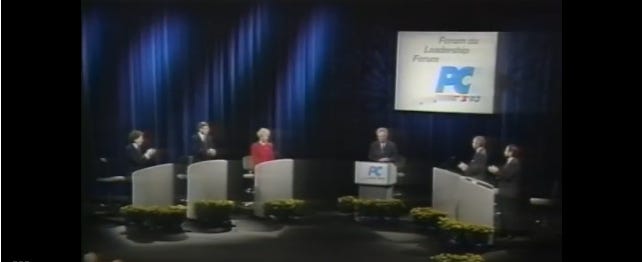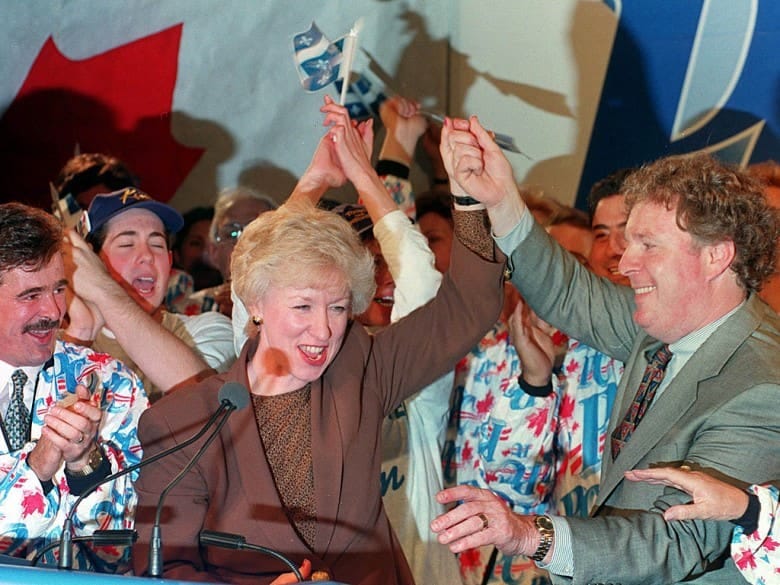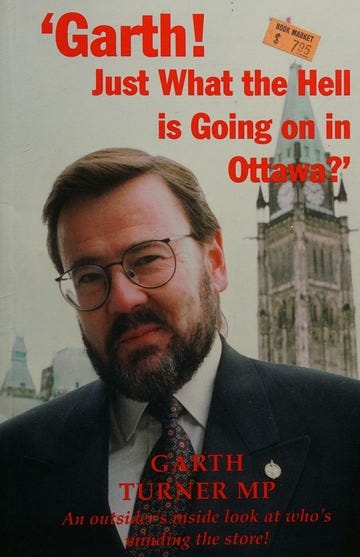1993, sort of
The current Liberal leadership race resembles the PCs in 1993, with a gender reversal
Last week I remembered there’s an Ontario election happening. This week I realized there’s a national Liberal leadership contest underway, and the winner will become Canada’s 24th prime minister. Remember when that sort of thing was the biggest political story out there? So I feel I should say something about the Liberal race. And once again I turn to a historical precedent. The current race closely resembles the 1993 Progressive Conservative leadership contest, though not quite as I expected.
That race of course was won by Kim Campbell, who then became Canada’s first and so far only woman prime minister, only to be defeated in a catastrophic election five months later. Campbell is the best example of the “glass cliff” phenomenon of parties turning to a woman leader only in distress, letting her take the wheel as the party drives over the brink to oblivion.
When Chrystia Freeland declared for the leadership, I and surely others feared we would see an exact recap of 1993; a woman given the captaincy only after the ship had already hit the iceberg, leading to a second failed female prime minister.
But a twist! It’s still like 1993. But the gender dynamics are reversed. Like Kim Campbell, Mark Carney is emerging as the Chosen One and Fresh Face, with Liberals flocking to the nation’s newest politician in greater numbers than I expected. This leaves Freeland as Jean Charest, the scrappy second place underdog.

Let’s review that 1993 race. When Brian Mulroney stepped down, anticipation was high for a competitive race despite the party’s abysmal popularity. But one-after-one, top ministers likes Michael Wilson, Perrin Beatty, and Barbara MacDougall all took themselves out of contention. Sound familiar so far? Left standing was defense minister Kim Campbell.
Things were looking so lopsided that thirty-four year old Jean Charest was pressured by Brian Mulroney and others to get in the race and make it look like the job was worth going for. This is something to reflect on; was this to stop Campbell or because it shouldn’t look too easy for a woman? Without trying to unpack the gender attitudes of 1993, I do think there was a strong assumption then, and now, that a competitive leadership race invigorates the party and raises the standing of the eventual winner. To not have a serious fight for the leadership of the PC party might signal that it wasn’t worth having…even if that did prove to be the case in November.
And so rather than a crowded field of heavyweights, it quickly became a race between the front runner cruising to their coronation and the scrappy lovable underdog unlikely to prevail. Sound familiar? But wait! There’s more!
Five candidates in 2025? There were five in 1993 too! The falling away of cabinet heavyweights and generally dire state of the party allowed three lesser candidates to find some oxygen. Anyone remember Jim Edwards? An Edmonton MP who had just been promoted to party whip. he seized the opportunity to be the third-place runner, perfectly respectable and filling out the ballot. Patrick Boyer was another ambitious but unknown MP who threw his hat in the ring. Finally, there was the more well-known backbencher Garth Turner, author of one of my favourite book titles, Garth! Just What the Hell is Going on in Ottawa?
This crew doesn’t match up exactly with Karina Gould, Frank Baylis, and Ruby Dhalla, but there’s enough resemblance. Baylis has Garth Turner qualities, particularly a hustling entrepreneurial mindset and healthy dose of self-confidence. Gould of course is really the new Jean Charest - both a similar age with impressive resumes that makes you wonder what you did/are doing/will do in your thirties - but is finding little traction in the race beyond gaining polite attention, just like Jim Edwards. I can’t think of any parallels between Ruby Dhalla and Patrick Boyer other than the common question of why in the world they’re running at all. But overall there’s a lot here.
So what happened in 1993? Well, let’s review and compare with 2025.
Kim Campbell won and became prime minister with a buzz of renewal and hope, so different from the dire polls under Mulroney. It all looked suddenly possible again…until election day, when the party fell from 169 to two seats.
Mark Carney….well…we will see…
Jean Charest, who came closer than expected to the leadership with 47% on the final second ballot, was one of those two seats. Finding the once coveted party leadership keys abandoned in a dumpster, he took the job and carried on for a few years until Quebec politics beckoned and he ran that province for a decade. With an unsuccessful federal comeback attempt in 2022.
I suspect that whatever happens on March 9, Chrystia Freeland will be on the Canadian political scene for a long time to come.
Jim Edwards won big from his gamble, at least in the short term, being named to Campbell’s cabinet as Treasury Board president and House Leader. He went down with the ship in November and hasn’t been seen in Ottawa since, though he seems to have found a good life back in Edmonton.
I don’t know if Karina Gould will retain her Burlington seat, but she’s put herself on the map and has a bright future (even more than she already had.)
Patrick Boyer did not make cabinet under Campbell; I assume there’s a good reason though it’s never been clear to me. An intellectual gadfly at heart, he also lost in November and returned to law and political science lecturing, where I met him a few times over the years. According to Wikipedia he has twenty-seven books to his name.
Again, not much in common with Ruby Dhalla, but who is also likely to return soon to obscurity.
The biggest winner of the 1993 race? I’ll go with Garth Turner, who became minister of national revenue - I think at his request - allowing him to run seminars for years afterward offering financial advice “from the man who ran Canada’s tax system.” He made a political comeback in 2006, lasting ten months in the Harper Conservative caucus before being expelled, later joining the Liberal party and publishing a sequel to his earlier Garth! book, Sheeple: Caucus Confidential in Stephen Harper’s Ottawa. He was one of the first major political bloggers in Canada, and continues to maintain his blog here.
Somehow, I think Frank Baylis will come out all right.





